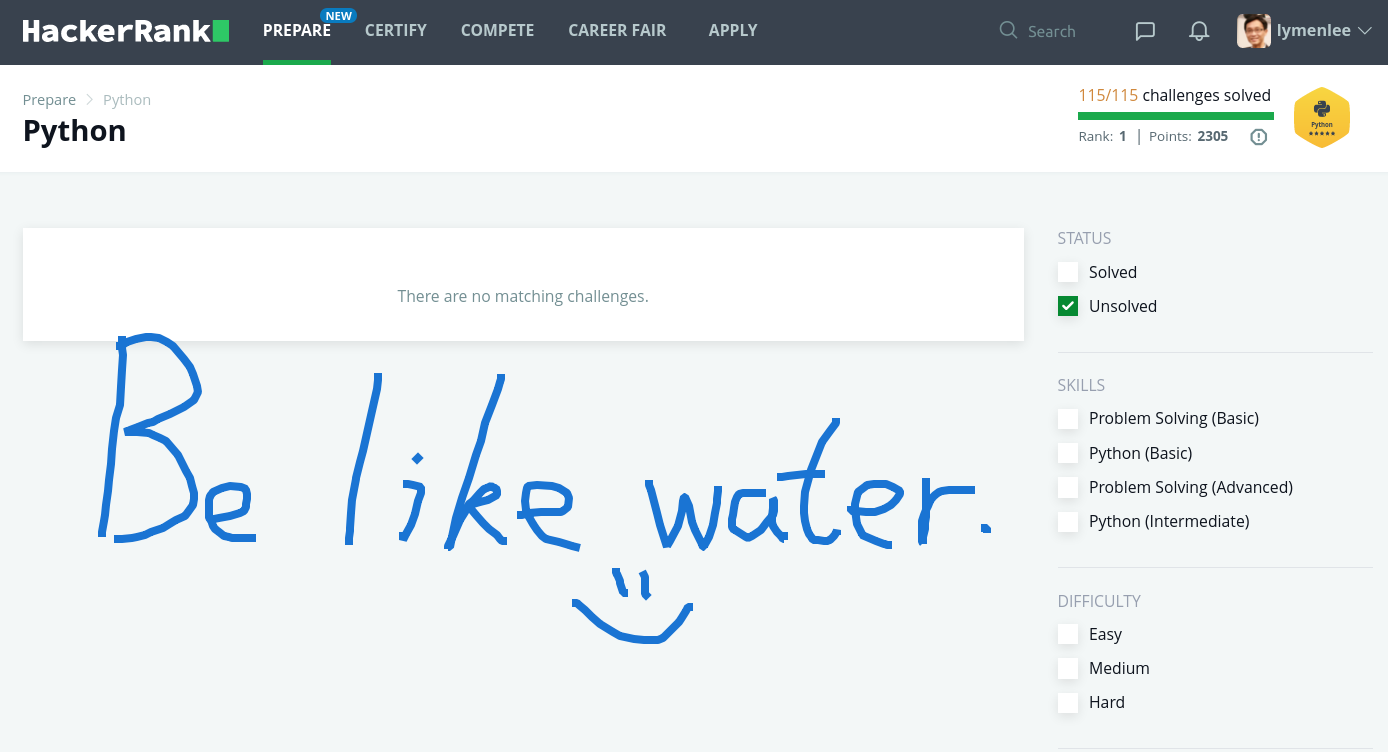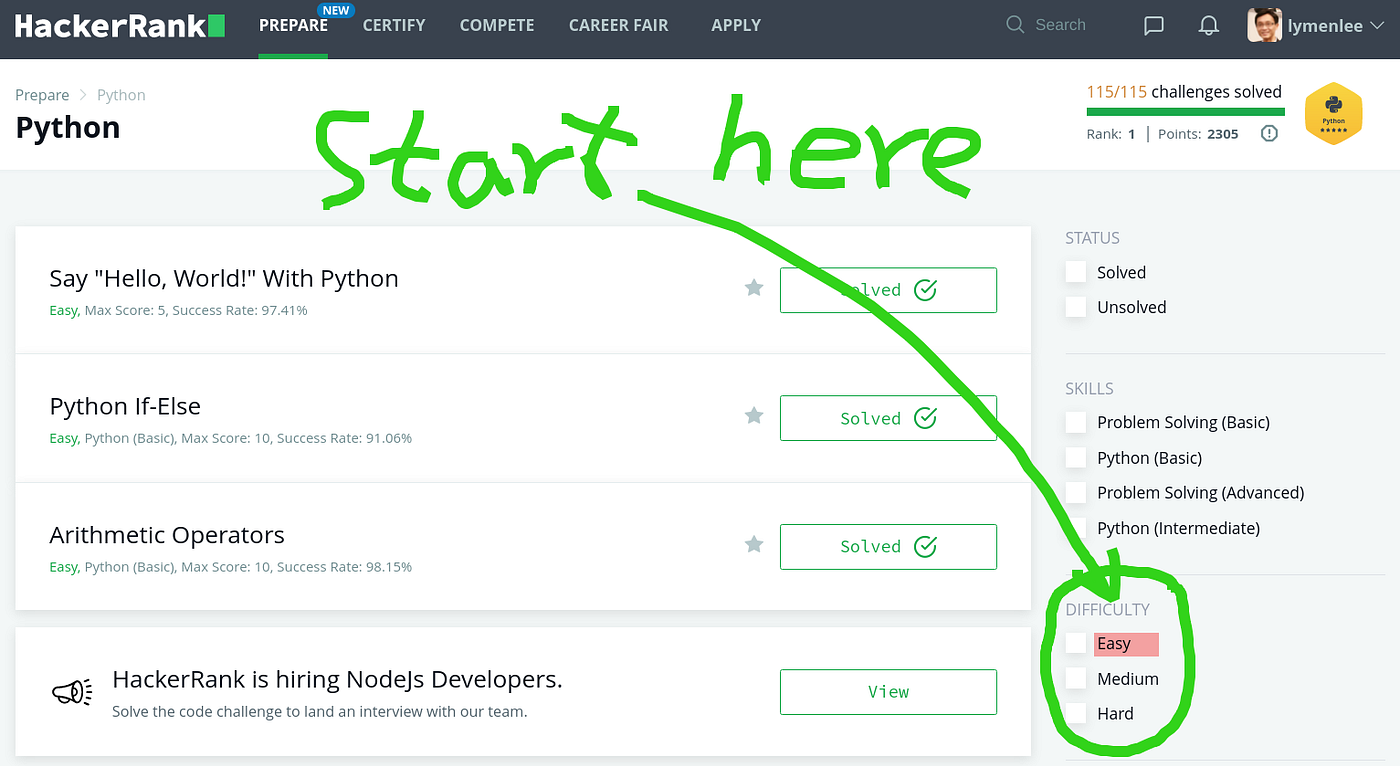Like most other competitive programming platforms, HackerRank groups challenges into different difficulty levels. When you first start, the best way is to use the filters on the right side, start from the ‘Easy’ ones, then gradually work your way down the difficulty chain.
So the best strategy is to start from ‘Easy,’ master all pieces of the programming languages. Then practice your ability to put multiple ones together to solve the ‘Medium’ problems. Once you feel comfortable doing that, try to tackle the ‘Hard’ ones. This way, the learning curve won’t be too steep, and you are more likely to succeed without frustration or get stuck.
I called it the RRR approach. Record, reapply and repeat. Let me explain what that means.
The discussion section probably is where most learning happens for me in Hackerrank. Here you can check other people’s solutions as well as their rationales. The community in Hackerrank is friendly, open, and helpful. People usually answer questions on why they approach particular challenges the way they do, with code snippets and links to good resources. So don’t ignore the discussion, EVEN IF YOU ALREADY CRACKED THE CHALLENGE!
My usual routine is to try to solve the problem all by myself, brute force or not. This helps me gain a deeper understanding of the problem. Then head over to the discussion section and check other people’s solutions. I tried to understand the solution without peeking at their explanation. If I stuck, I’d then check the explanation. I can’t tell how many times I was wowed by the brilliant, beautiful, and elegant solutions other people came up with. I’ll usually take notes and try to apply those in my future challenges too.
There is a gotcha, though. The community tends to upvote those ‘sexy’ one-liners, even if they are hard to read. You might also want to do that in your solution. It makes you feel well. Don’t get too obsessed! Readability still trumps one-liners every day in the real world. Going to the other extreme of always trying to do one-liners will actually hurt your coding style.
Doing coding challenges, and you’ll inevitably encounter your ‘stuck’ moment. No matter how much time you spend, how many different things you throw at the problem, you still can’t find a way out. This is where the ’15 minutes’ rule comes into play:
Take 15 minutes to solve the problem any way you can. However, if you don’t have an answer after 15 minutes, you must ask someone.”
The truth is it’s not worth it to get stuck in a problem for more than 15 minutes, most of the time. Not all challenges are created equal. Some challenges are not well designed or elaborated(this is especially the issue Hackerrank mostly complained about). So don’t sweat them. Just head to the discussion section and look at other people’s solutions. Sometimes you’ll find others complaining about the vagueness of the question, and you’ll thank me for not wasting 1 hour of your precious time on a stupid question.
SSome challenges give you a lot of pre-written boilerplate codes and only leave one function for you to fill. This is usually helpful. You can focus on the problem to be solved instead of the ‘logistic codes’. Yet sometimes, I found the provided codes limiting my thinking. Some provided codes will import certain libraries for you, and if you use them, you’ll be solving the problem using them. However, the optimum solution might not use the libraries at all. And the problem is solvable with multiple approaches, and you are limited just using the provided libraries. So my suggestion is, well, you don’t have to follow the provided codes if you have better ideas. For example, the Time Delta challenge gives you re, os, math, random, sys, yet you don’t have to use any of them. The best way is just to use the DateTime lib or calendar lib.
There is a virtual currency reward for solving challenges called Hackos in Hackerrank. Yet there aren’t many places you can use them. The biggest use is to unlock test cases of the challenges. Challenges use these test cases to judge whether you passed or not. Sometimes your solution work on part of the test cases but not all, and you can unlock those test cases that you fail and better debug your code. My advice: Don’t skimp your Hackos. There are not many uses for Hackos elsewhere anyway, so totally use it to unlock those test cases and accelerate your growth. Find out where you fall and solve the darn problem.
This is for you vim or emacs enthusiasts. If you happen to be one, doing so will definitely improve your coding experience, if not your coding efficiency. Hackerrank’s code editor supports vim or emacs shortcuts. So if you code faster with these two apps, you should totally turn the switch on.
Hackerrank offers certifications in many languages and different levels. For Python, they only provide the ‘Basic’ level. So if you happen to have cleared all the challenges, then take the certification test by no means. It will be a breeze, and who doesn’t like a shiny badge on their profile for potential recruiters to see?
It took me three weeks to clear all Python challenges on Hackerrank. (A bit longer than the SQL challenges, I have another article talking about my SQL takes, you can check it out if interested.) The biggest takeaway for me is:
The challenges I learned the most are the ones that took me the longest. Even applying the 15 minutes rule, I still had a hard time figuring out other people’s solutions, implementing them into my own, etc. I guess that’s because I’ve found the weakest spot of my knowledge?
When you are failing, that’s when your chance of real growth shows itself. Embrace it, cherish it, grab it, don’t fear it. Making it the stepping stone of your future success. Almost all successful people walk this path. Fail 99 times quickly and efficiently, then get to the final big success you deserve.
I hope you find this article enjoyable to read and learned a thing or two from it. If you want to know more about what I think, practice, and write about data science, consider signing up to become a Medium member. It’s $5 a month, giving you unlimited access to stories on Medium. If you sign up using my link, I’ll earn a small commission.
Data Scientist | Blogger | Product Manager | Developer | Pentester | https://www.linkedin.com/in/michael-li-dfw
No Idea! [HackerRank] [Interview] | Python | Problem Solving
Hands-on practice problems from Coding for Interviews
You are registered for the contest.
Hackerrank Coding Questions for Practice
Below you can find the Top 25 Hackerrank based coding questions with solutions for the Hackerrank Coding test. in this article we have collected the most asked and most important Hackerrank coding questions that you need to prepare to successfully crack Hackerrank coding round for companies like IBM, Goldman Sachs, Cisco, Mountblu, Cognizant, etc.
Here you can practice all the Top 25 free !!! coding questions that were asked in the latest placement drives held by Hackerrank Hackerrank Coding questions are bit difficulty then the usual coding questions, as most of the product based companies hire through this platform.
Watch the below tutorial on Python interview questions and answers:
That will boost your coding speed and efficiency

I recently published a piece about how I cleared all HackerRank SQL challenges in two weeks. It was a fun ride, and there’s no reason not to ride on the momentum and brush up my Python skills. So here I am, three weeks later, writing this article sharing my experience and tips with you on what I’ve learned from the journey. There will be no code in this article, so worry not even if you know squat about Python or Hackerrank. This article will share seven tips that I wish I know before I start doing Hackerrank challenges. This article is about Python challenges, yet it will also generalize to other languages and other competitive programming platforms. I hope you can learn a thing or two. Let’s jump right in!
Like most other competitive programming platforms, HackerRank groups challenges into different difficulty levels. When you first start, the best way is to use the filters on the right side, start from the ‘Easy’ ones, then gradually work your way down the difficulty chain.

There are three difficulty levels:
So the best strategy is to start from ‘Easy,’ master all pieces of the programming languages. Then practice your ability to put multiple ones together to solve the ‘Medium’ problems. Once you feel comfortable doing that, try to tackle the ‘Hard’ ones. This way, the learning curve won’t be too steep, and you are more likely to succeed without frustration or get stuck.
I called it the RRR approach. Record, reapply and repeat. Let me explain what that means.
FAQ
What are the basic Python questions asked in interview?
- What is Python? …
- What is a dynamically typed language? …
- What is an Interpreted language? …
- What is PEP 8 and why is it important? …
- What is Scope in Python? …
- What are lists and tuples? …
- What are the common built-in data types in Python? …
- What is pass in Python?
How do I run a Python code in HackerRank?
Is HackerRank good for interview preparation?
What is HackerRank Python?